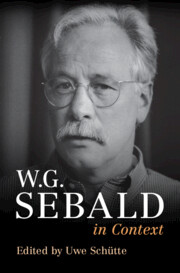Book contents
- W.G. Sebald in Context
- W.G. Sebald in Context
- Copyright page
- Dedication
- Contents
- Illustrations
- Notes on Contributors
- Preface
- Acknowledgements
- Note on Text
- Chronology
- Abbreviations
- Works by W.G. Sebald
- Part I Biographical Aspects
- Part II The Literary Works
- Part III Themes and Influences
- Chapter 17 Critical Writings
- Chapter 18 Minor Writing
- Chapter 19 Franz Kafka
- Chapter 20 Literary Predecessors
- Chapter 21 Walter Benjamin
- Chapter 22 Philosophical Models
- Chapter 23 History
- Chapter 24 Polemics
- Chapter 25 Holocaust
- Chapter 26 Photography
- Chapter 27 Paintings and Ekphrasis
- Chapter 28 Media Theory
- Chapter 29 Travel Writing
- Chapter 30 Ecocriticism and Animal Studies
- Part IV Reception and Legacy
- Further Reading
- Index
Chapter 30 - Ecocriticism and Animal Studies
from Part III - Themes and Influences
Published online by Cambridge University Press: 24 August 2023
- W.G. Sebald in Context
- W.G. Sebald in Context
- Copyright page
- Dedication
- Contents
- Illustrations
- Notes on Contributors
- Preface
- Acknowledgements
- Note on Text
- Chronology
- Abbreviations
- Works by W.G. Sebald
- Part I Biographical Aspects
- Part II The Literary Works
- Part III Themes and Influences
- Chapter 17 Critical Writings
- Chapter 18 Minor Writing
- Chapter 19 Franz Kafka
- Chapter 20 Literary Predecessors
- Chapter 21 Walter Benjamin
- Chapter 22 Philosophical Models
- Chapter 23 History
- Chapter 24 Polemics
- Chapter 25 Holocaust
- Chapter 26 Photography
- Chapter 27 Paintings and Ekphrasis
- Chapter 28 Media Theory
- Chapter 29 Travel Writing
- Chapter 30 Ecocriticism and Animal Studies
- Part IV Reception and Legacy
- Further Reading
- Index
Summary
Throughout his work, Sebald engages intensively with ecological issues which this essay examines, using the theories of Ecocriticism and Cultural and Literary Animal Studies. Two aspects of Sebald’s concept of ‘nature’ are particularly important. First, the notion of ‘nature’ in his writings proves inherently contradictory: nature is at both a self-destructive force and a precious good, subject to human destruction. Therefore, humans appear sometimes as helpless victims of the forces of nature, and sometimes as ruthless destroyers of nature. Second, in Sebald’s concept of ‘nature’ , culture and nature do not constitute opposites. Instead, man is not seen as a counterpart of nature, but as an integral part of it, as a product of a nature through which it accomplishes its self-destruction. The destruction of nature is accordingly understood as an interplay of different actors. Non-human nature (plants and animals as well as landscapes) are perceived as actors in a system in which each element contributes to the self-destruction of earth, connecting man, animals and natural world by their shared suffering.
- Type
- Chapter
- Information
- W. G. Sebald in Context , pp. 265 - 274Publisher: Cambridge University PressPrint publication year: 2023

